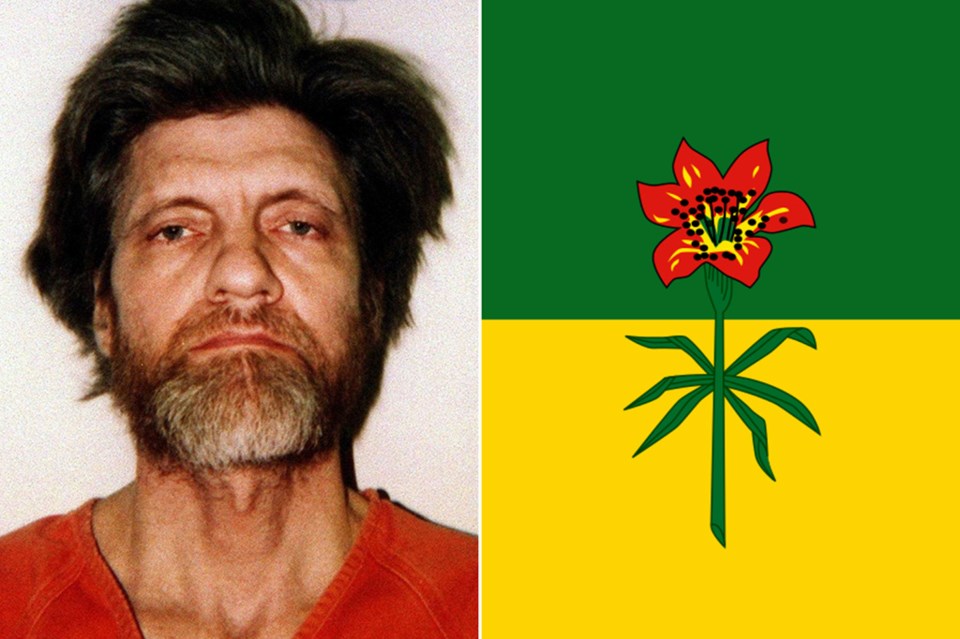REGINA — Ted Kaczynski died on June 10 of a reported suicide in his prison cell. He had been serving four life sentences for a bombing campaign that lasted 17 years, killed three people, injured 23 others, and gave Kaczynski the infamous nickname UNABOMBER after the universities (UN) and airlines (A) he attacked. As his bombs were mailed in untraceable packages accompanied by sophisticated screeds against industrial society, Kaczynski caused the largest manhunt in US history which finally ended in a Montana cabin in 1996.
But before he was the most wanted man in America, Ted most wanted Canada — to live in, not to bomb. Saskatchewan was one of his targets.
—
In June 1969, Dr. Theodore Kaczynski, a Harvard-educated math professor, abandoned forward-thinking academia for backwoods dreams. Driving a ‘67 Chevelle, he left UC Berkeley to meet his younger brother David in Wyoming, from where they embarked on a summer-long search for paradise in western Canada. Ted and David surveyed Saskatchewan, Alberta, British Columbia, and the Yukon, living out of the car and sleeping under the stars. Near Prince George, BC, about a mile from any road, Ted found a lush plot of crown land. He applied for a homesteading permit and returned to America with David to await a response.
“The British Columbia government took more than a year to act on my application to lease land, and then they denied it,” recalled Ted in his book Truth Versus Lies. “It seemed very poorly worded, to the effect that the land was not available,” David told The New York Times. He added that Ted was prevented from even visiting the plot. “It seemed they changed the policy.”
Ted again searched Canada in 1970, but by then he was “getting discouraged and wasn’t trying very hard.” He refocused on the States, specifically Montana, where David had moved and offered his brother halfsies on nearby wilderness land. Thus, in 1971, Ted and David bought a 1.4-acre plot near the town of Lincoln, less than a four-hour drive from Saskatchewan. Ted built a cabin and lived primitively while David left for civilization and eventually set its guards upon his shared blood and soil.
Ted’s cabin was isolated but “not nearly as isolated as [he] would have liked.” Developers and vacationers were threatening his lifestyle, so he secretly sabotaged motorcycles, snowmobiles, logging equipment, and modern homes. By the late ‘70s, Ted, now a criminal, renewed hopes for Canadian liberation. He borrowed his brother’s ‘75 Datsun and, as David told his FBI collaborators right before Ted’s arrest, spent the summer of ‘79 looking for land in Saskatchewan.
Although Ted had planned a getaway to northern Canada, first in Ontario and later in a “more promising region,” the “Canadian wilderness trip never came off.” That means either David forgot the trip hadn’t happened or Ted hadn’t told him the truth. And since Ted had by summer ‘79 already delivered two bombs, both of which burned flesh at Illinois’s Northwestern University, the “Saskatchewan trip” may have been cover for nefarious use of David’s car. In fact, he spent that summer and fall building and transporting the bomb that smoked out American Airlines Flight 444 and alerted the FBI to a new domestic terrorist. The long fuse on the Unabomber had been lit.
—
Ted’s autobiography, written the same year as the American Airlines bombing, describes a darkly prophetic idea he had in 1966:
“I thought, well, as long as I am going to throw everything up anyway, instead of having to shoot it out with the cops or something, I will do what I've always wanted to do, namely, I will go up to Canada, take off into the woods with a rifle, and try to live off the country. If that doesn't work out, and if I can get back to civilization before I starve, then I will come back here and kill someone I hate.”
Like Hitler and art school, one wonders if mass murder wouldn’t have happened had Canada accepted Ted.
— Shane Fraser is a writer of fiction and nonfiction from Regina, Sask.
This story has been informed by open source research.



